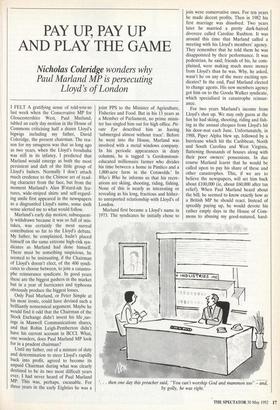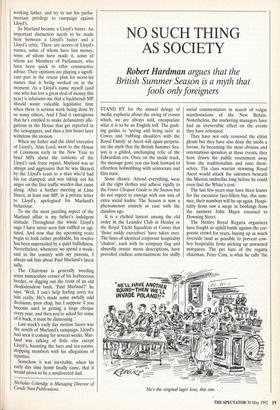PAY UP, PAY UP AND PLAY THE GAME
Nicholas Coleridge wonders why
Paul Marland MP is persecuting Lloyd's of London
I FELT A gratifying sense of told-you-so last week when the Conservative MP for Gloucestershire West, Paul Marland, tabled an early day motion in the House of Commons criticising half a dozen Lloyd's bigwigs including my father, David Coleridge, the present chairman. The rea- son for my smugness was that as long ago as two years, when the Lloyd's brouhaha was still in its infancy, I predicted that Marland would emerge as both the most persistent and daft of the little group of Lloyd's baiters. Normally I don't attach much credence to the Chinese art of read- ing character from the face, but from the moment Marland's Alan B'stard-ish fea- tures, wide-striped shirts and self-regard- ing smile first appeared in the newspapers as a disgruntled Lloyd's name, some sixth sense alerted me to what would follow.
Marland's early day motion, subsequent- ly withdrawn because it was so full of mis- takes, was certainly the most surreal contribution so far to the Lloyd's debate. My father, he complained, hadn't placed himself on the same extreme high-risk syn- dicates as Marland had done himself. There must be something suspicious, he seemed to be insinuating, if the Chairman of Lloyd's doesn't elect, of the 400 syndi- cates to choose.between, to join a catastro- phe reinsurance syndicate. In good years these are the biggest gushers in the market but in a year of hurricanes and typhoons obviously produce the biggest losses.
Only Paul Marland, or Peter Simple at his most ironic, could have devised such a brilliantly nonsensical argument. Maybe he would find it odd that the Chairman of the Stock Exchange didn't invest his life .sav- ings in Maxwell Communications shares, and that Robin Leigh-Pemberton didn't have his current account in BCCI. What, one wonders, does Paul Marland MP look for in a prudent chairman?
Until my father, out of a mixture of duty and determination to steer Lloyd's rapidly back into profit, agreed to become its unpaid Chairman during what was clearly destined to be its two most difficult years ever, I had never heard of Paul Marland MP. This was, perhaps, excusable. For three years in the early Eighties he was a
joint PPS to the Minister of Agriculture, Fisheries and Food. But in his 13 years as a Member of Parliament, no prime minis- ter has singled him out for high office. Pri- vate Eye described him as having `submerged almost without trace'. Before he went into the House, Marland was involved with a metal windows company. In his periodic appearances in diary columns, he is tagged 'a Gordonstoun- educated millionaire farmer who divides his time between a home in Pimlico and a 1,000-acre farm in the Cotswolds.' In Who's Who he informs us that his recre- ations are skiing, shooting, riding, fishing. None of this is nearly as interesting or revealing as his long, fractious and hither- to unreported relationship with Lloyd's of London.
Marland first became a Lloyd's name in 1973. The syndicates he initially chose to
join were conservative ones. For ten years he made decent profits. Then in 1982 his first marriage was dissolved. Two years later he married a pretty dark-haired divorcee called Caroline Rushton. It was around this time that Marland called a meeting with his Lloyd's members' agency. They remember that he told them he was disappointed by their performance. It was pedestrian, he said; friends of his, he com- plained, were making much more money from Lloyd's than he was. Why, he asked, wasn't he on any of the more exciting syn- dicates? In the end, Paul Marland elected to change agents. His new members agency got him on to the Gooda Walker syndicate, which specialised in catastrophe reinsur- ance.
For two years Marland's income from Lloyd's shot up. We may only guess at the fun he had skiing, shooting, riding and fish- ing as the annual cheques from Lloyd's hit his door-mat each June. Unfortunately, in 1988, Piper Alpha blew up, followed by a hurricane which hit the Caribbean, North and South Carolina and West Virginia, flattening thousands of houses along with their poor owners' possessions. In due course Marland learnt that he would be called upon to pay his share of these and other catastrophes. This, if we are to believe the newspapers, will set him back about £100,000 (ie, about £60,000 after tax relief). When Paul Marland heard about the bill, he seemed to know exactly how as a British MP he should react. Instead of speedily paying up, he would devote his rather empty days in the House of Com- mons to abusing my good-natured, hard-
. . then one day dus preacher said, "You can't worship God and mammon too" — and, by golly, he was right.' working father, and try to use his parlia- mentary privilege to campaign against Lloyd's.
So Marland became a Lloyd's baiter. An important distinction needs to be made here between a Lloyd's baiter and a Lloyd's critic. There are scores of Lloyd's names, some of whom have lost money, some of whom have made it, some of whom are Members of Parliament, who have been quick to offer constructive advice. Their opinions are playing a signifi- cant part in the rescue plan for worst-hit names that is being worked on at the moment. As a Lloyd's name myself (and one who has lost a great deal of money this year) it infuriates me that a backbench MP should waste valuable legislative time when there is serious work being done by so many others. And I find it outrageous that he's entitled to make defamatory alle- gations in the House that get reported in the newspapers, and then a few hours later withdraw the motion.
When my father and the chief executive of Lloyd's, Alan Lord, went to the House of Commons early in the New Year to brief MPs about the contents of the Lloyd's task force report, Marland was so abrupt and aggressive that he was likened by the Lloyd's team to a man who'd had his car clamped, and was taking out his anger on the first traffic warden that came along. After a further meeting at Lime Street, at least one MP, in a private letter to Lloyd's, apologised for Marland's behaviour.
To me the most puzzling aspect of the Marland affair is my father's indulgent attitude. Throughout the whole Lloyd's saga I have never seen him ruffled or agi- tated. And now that the upcoming years begin to look rather profitable, his resolve has been superseded by a quiet bullishness. Nevertheless, whenever we spend a week- end in the country with my parents, I always ask him about Paul Marland's latest sally.
The Chairman is generally weeding some immaculate corner of his herbaceous border, or digging out the roots of an old rhododendron bush. Paul Marland?' he says. 'Well, I can't help feeling sorry for him really. He's made some awfully odd decisions, poor chap, but I suppose if you become used to getting a large cheque every year, and then you're asked for some of it back, it must be distressing .'
Last week's early day motion fiasco was the zenith of Marland's campaign. Lloyd's had seen it coming for several weeks. Mar- land was talking of little else except Lloyd's, haunting the bars and tea-rooms, stopping members with his allegations of injustice.
Somehow it was inevitable, when his early day time bomb finally came, that it would prove to be a misdirected dud.
Nicholas Coleridge is Managing Director of Conde Nast Publications.

















































 Previous page
Previous page